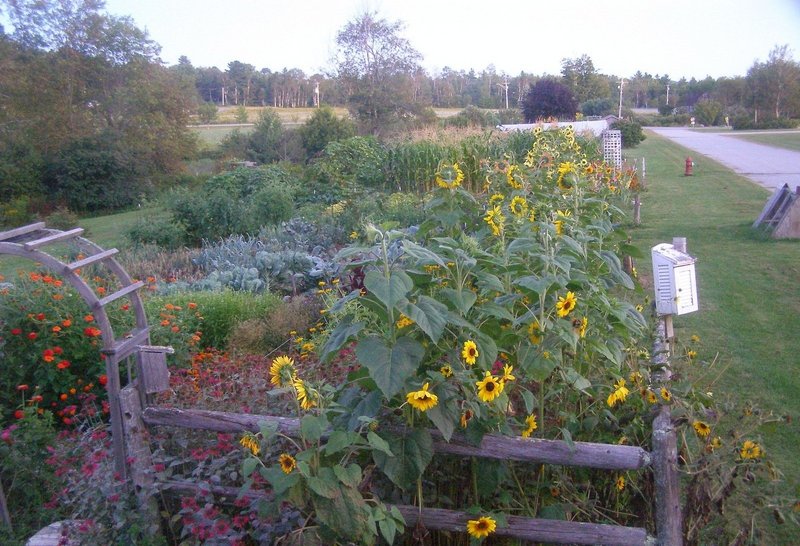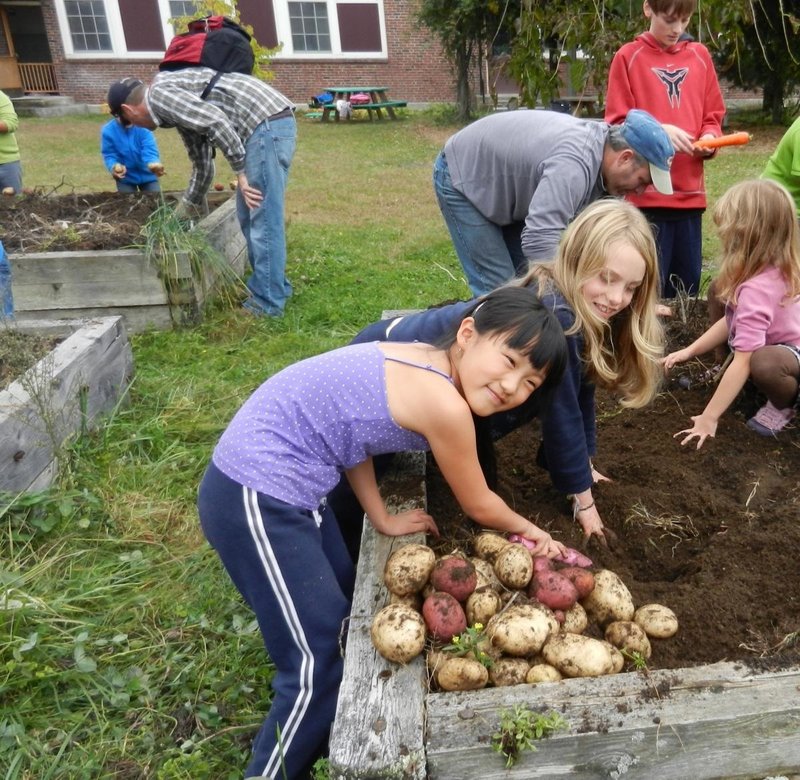At the Troy Howard Middle School in Belfast, the students make more than $6,000 a year from crops grown in the school’s garden. This Saturday, the public is invited to tour the extensive garden as part of the statewide School Garden Open House Day.
“We have a half-acre of mixed vegetables, an orchard and flower gardens,” said Jon Thurston, agricultural coordinator for RSU 20, which includes Belfast. “We have two unheated hoop houses and one 24-by-48 heated greenhouse.”
The school district pays Thurston’s salary and buys the oil for the greenhouse. But Thurston is able to cover the rest of the garden-related expenses from the income the students earn selling at a farm stand, to the Belfast Co-op and to the school’s cafeteria.
Along the way, the students learn about plant life cycles, mapmaking, business plan writing and how to balance a checkbook, among other skills at the school where the garden is embedded into much of the curriculum. The students also gain exposure to a wide variety of vegetables (greenhouse-grown artichokes are the new favorite) and the cafeteria gains a steady supply of the freshest, most local food.
“It helps the kids,” Thurston said. “First off, in middle school they’ve just come from grade school with recess, so they can’t wait to get out here and have a project. They get a feeling of accomplishment and they feel they’ve done something worthwhile. Kids who aren’t good at math and writing are good out here and so their self esteem goes up. It’s a wonderful lab for science.”
Such positive outcomes can be found wherever schools make vegetable gardening part of the course work.
“It’s really an incredible outdoor laboratory for every teacher and every classroom,” said Kat Coriell, board chair of the Maine School Garden Network, which organizes the annual garden open house event. “An art teacher can go out and use different materials for weaving or leaf rubbing. History teachers show how food is related to culture and history. In language arts, it’s storytelling. The obvious ones are math and science.”
With communities looking to reverse the obesity epidemic and improve school lunch, gardens have proliferated around the state. The Maine School Garden Network counts more than 90 school gardens in Maine, but Coriell said that number likely represents only two-thirds of the school gardens in the state.
“We’ve been trying for a couple years to get a handle on the number,” Coriell said.
School gardens also offer students ready access to ingredients for cooking and meal planning lessons. And when they cultivate a plant from seed to harvest, they become much more likely to try the unfamiliar.
“Kids get really excited about eating vegetables,” Coriell said. “It’s really huge that they’re invested.”
The garden tours mark the end of the annual Maine Harvest Lunch Week, when schools around the state make a special effort to serve foods grown and raised in Maine. It’s an event credited with helping more schools purchase food from local farmers, and at schools with gardens, some of the local food will have traveled no further than the schoolyard.
In 2002, Anne Johnson, then education coordinator at the Maine Organic Farmers and Gardeners Association, and University of Maine at Orono professor Mary Bird founded the Maine School Garden Network, as a way to support and promote school gardens. But after Johnson died in 2004, the organization languished until 2008 when volunteers reignited the network.
Until last year, the organization was funded through MOFGA but now has a coordinator who is based in the Department of Agriculture building in Augusta, and the group is working to become an independent nonprofit. Its 12 person board of directors is looking for others to join the board.
While no longer an official program of MOFGA, Coriell said “school gardens are organic by default.” Pesticide use is restricted on school grounds and a pesticide applicators license is needed even to apply controls allowed under organic certification laws. So, the kids and their teachers must learn to roll with nature’s pests and ever-changing conditions.
Even having a crop wiped out by Japanese beetles is an opportunity for learning.
As Coriell said, “It’s a lesson in patience and perseverance.”
Avery Yale Kamila is a freelancer who lives in Portland, where she enjoys garden-fresh vegetables and writes about health food. She can be reached at:
avery.kamila.gmail.com
Twitter/AveryYaleKamila
Send questions/comments to the editors.




Success. Please wait for the page to reload. If the page does not reload within 5 seconds, please refresh the page.
Enter your email and password to access comments.
Hi, to comment on stories you must . This profile is in addition to your subscription and website login.
Already have a commenting profile? .
Invalid username/password.
Please check your email to confirm and complete your registration.
Only subscribers are eligible to post comments. Please subscribe or login first for digital access. Here’s why.
Use the form below to reset your password. When you've submitted your account email, we will send an email with a reset code.